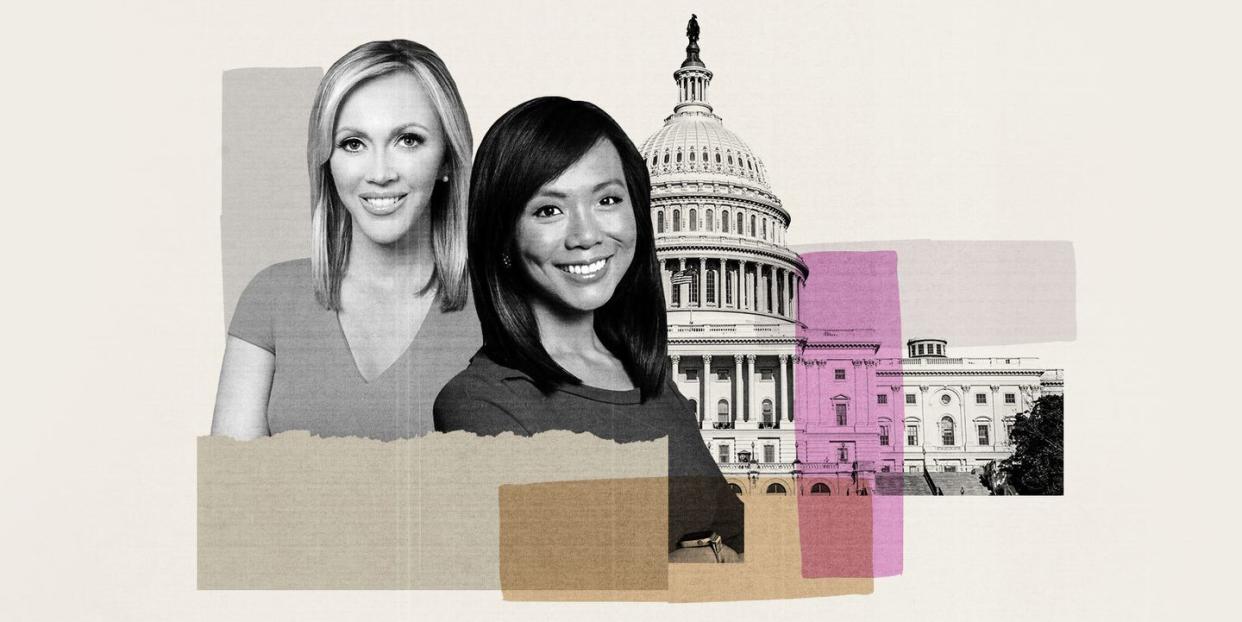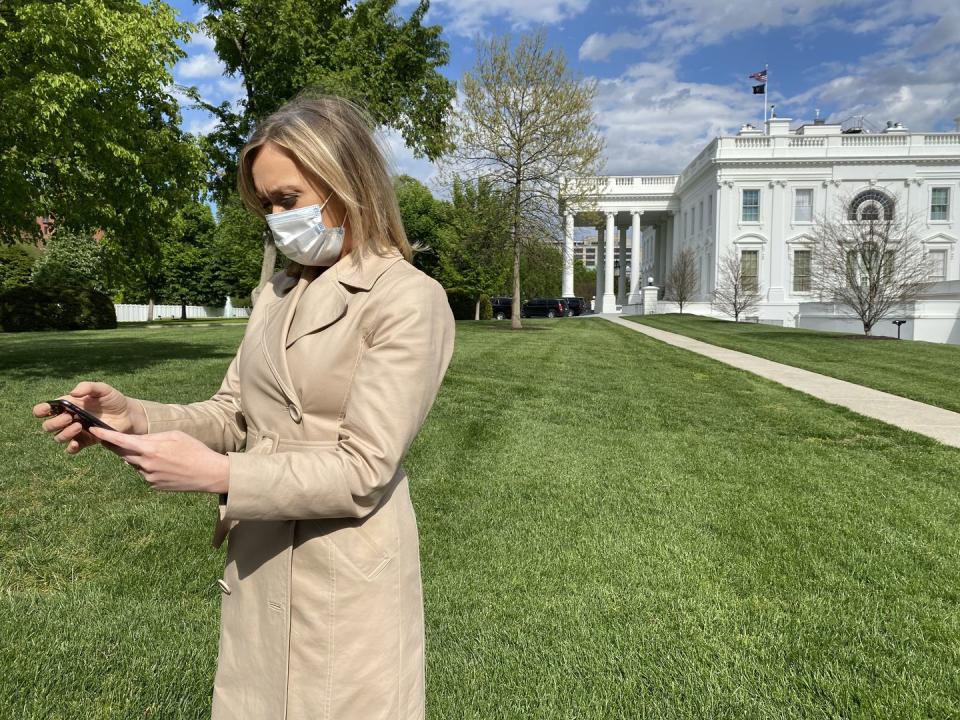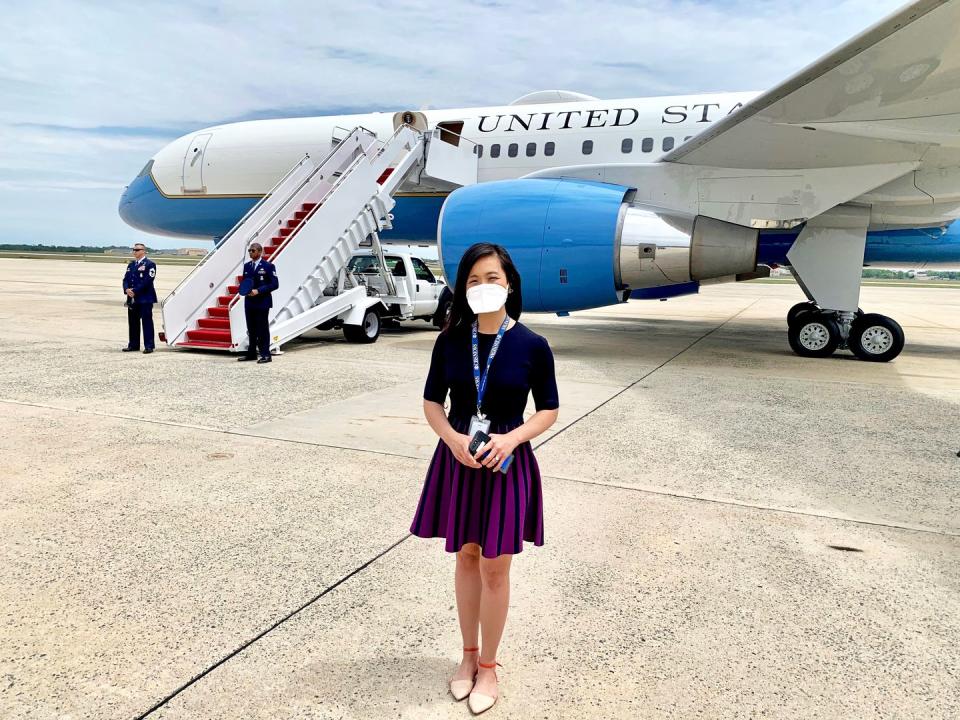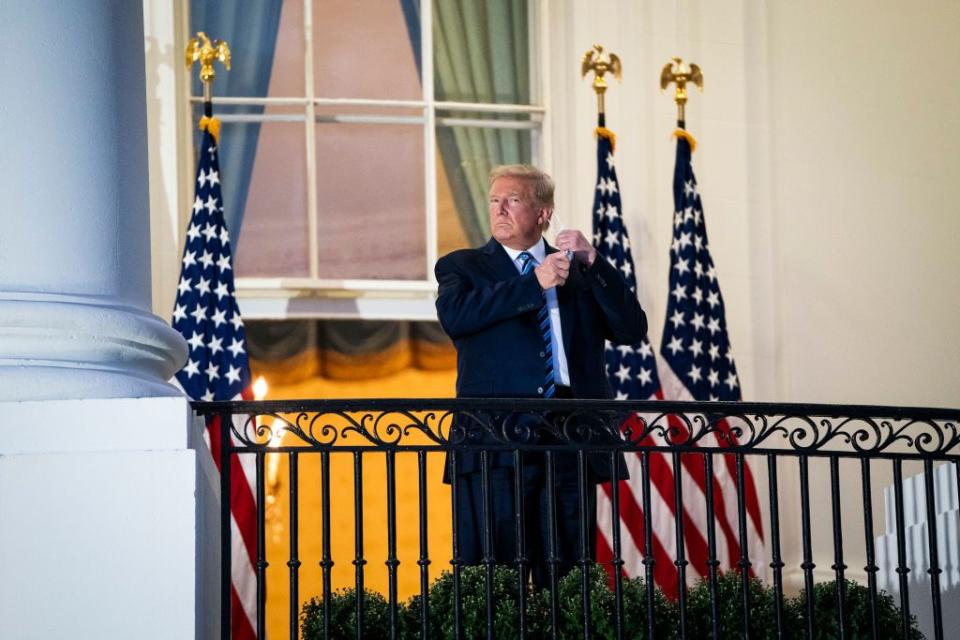Being a White House Reporter Wasn’t Supposed to Be Dangerous. Then Came COVID-19.

CBS White House correspondent Weijia Jiang was flying on Air Force One several hours after September's so-called “super spreader” event at the White House Rose Garden when President Donald Trump popped his head into the press cabin to say hello. One week later, he tested positive for COVID-19, and Jiang had a lot to consider. Had she contracted the virus? Had she endangered her nearly two-year-old daughter?
“We’ve done everything we can to protect ourselves,” Jiang tells me, “but some things are out of our control.” Two weeks of quarantine and four negative tests later, Jiang went back on-air on October 12 to talk about Trump's return to the campaign trail.
16 days ago after the SCOTUS Rose Garden event, I went to a rally on AF1. The President came back to chat to us, so I was WFH ever since.
4 negative tests later, I’m glad to be back in action with the @CBSNews White House team, including producer extraordinaire @finnygo 👍🏼 pic.twitter.com/xewnftZS2W— Weijia Jiang (@weijia) October 12, 2020
In a pre-pandemic world, White House correspondents like Jiang and her colleague Paula Reid would have been on the road with the president, elbow-to-elbow in gaggles or angling for quotes in crowded briefing rooms. Instead, they’re social distancing at presidential pressers and interviewing the nation’s most powerful people from home in their pajamas when they can.
Members of the Trump administration have repeatedly flouted basic safety precautions like wearing masks and quarantining—putting themselves and all who come in contact with them at risk—as evidenced by the at least 20 White House employees to have contracted the virus so far. Now Jiang, Reid, and other journalists are wrestling with a complicated new reality: Can you safely cover the president if he can't keep himself safe?
“We faced a significant risk of exposure working in the West Wing,” says Reid, who notes she has turned down assignments that would place her near unmasked officials. “Most of [Trump's] staff did not engage in mitigation like masks or social distancing.”
The job of a White House reporter is to keep tabs on everything the chief executive does, thinks, and plans. They travel in a roving pool around the country, attend briefings inside the West Wing, and build relationships with the president's closest advisers. It is frontline work that often hinges on physical proximity. And in the age of COVID-19, it has become one of the riskiest assignments in journalism. At least three White House correspondents have tested positive for the virus, which has killed more than 214,000 Americans and infected 7.5 million more.
The virus has ensnared several Trump officials that frequently meet with reporters, including press secretary Kayleigh McEnany. Reid recalls sitting across from her at a news briefing just a few days before McEnany tested positive in October. Now Reid gets tested every other day, and makes calls to insiders like Dr. Fauci from a desk at home. “Everyone knows in-person is the best way to communicate with sources,” Reid tells me, “but everyone also understands that's not possible right now.”
I sat in close proximity to two maskless, now COVID positive, White House staffers at last Thursday’s briefing. So I am now working from home & getting regular COVID tests. pic.twitter.com/B8JdrLEq55
— Paula Reid (@PaulaReidCBS) October 5, 2020
Jiang calls it "unfortunate" to have to miss face-to-face interactions when she’s working from home, which she’s doing more often these days. Her job relies on deciphering facial expressions and reading reactions in order to craft the perfect followup question in real-time. That's especially true with this president. During a Rose Garden press conference in March, Jiang asked Trump if he would get swabbed after being exposed to the Brazilian president's press secretary, who tested positive for COVID-19 following a meeting at Mar-a-Lago. Trump responded that Americans shouldn't "be jumping to get the test unless it's necessary.”
"So then I asked, 'Are you being selfish by not getting a test?'" Jiang says. "That's when the real answer came. The president told me he would get a test and, sure enough, later that day he got his first one."
Jiang and Reid are among several women White House reporters who have gained prominence these last four years for ably sparring with the president. When Jiang, an American journalist of Chinese descent, asked about the spread of COVID-19 during a Rose Garden press briefing in May, Trump responded: "Don’t ask me, ask China that question,” with an emphasis on the word China. The moment, caught on camera, stunned Jiang. “Sir, why are you saying that to me, specifically?” she asked.
Trump then tried to call on other reporters—first, CNN White House Correspondent Kaitlan Collins, then PBS NewsHour White House Correspondent Yamiche Alcindor—but they both waived their time and motioned back to Jiang.

Critics condemned the president on Twitter calling his comment “racist." Jiang, who stayed off of social media in the aftermath of the barbed exchange, now says she didn't take it personally. “Part of the job is being prepared for everything, regardless of who we are questioning,” she says. “My follow-up question is one I would have asked anybody if they were trying to make a 180 and pivot away from the original content of the question.”
After the news conference, Jiang met Reid near the North Lawn of the White House. Reid gave her a hug, and asked if she was okay. "There are very few people who understand what it's like to ask the President of the United States questions, and to have him engage with you," Jiang says.
Both Jiang and Reid graduated from William and Mary in 2005, but had different majors and didn't cross paths until landing at CBS. Reid clerked for several judges after school, and started at the network in 2010 to cover legal affairs and federal law enforcement. Jiang began her television career in Baltimore, before moving to D.C. to work for CBS in 2014.
Along with fellow White House CBS correspondent Ben Tracey, they now specialize in the kind of dogged reporting that makes them frequent targets of Trump, who has a history of using the bully pulpit to call out particular members of the press. Back in April, Reid pressed Trump on the assertion that the federal government "bought time" when it restricted travel from China. “You’re so disgraceful,” Trump responded. “It’s so disgraceful the way you say that.” Reid then pointed to a nearly month-long gap in a campaign video that Trump played at a press briefing. "You know you're a fake, your whole network, the way you cover it is fake," Trump told her.

Three weeks later, Trump tried to score a point against Reid by calling her “angry” in an interview with the New York Post. “It wasn’t like Donna Reed, I can tell you that,” Trump said referring to the actress Donna Reed, who played an archetypal '50s housewife on the sitcom The Donna Reed Show. “Paula Reid, she’s sitting there and I say, ‘How angry. I mean, what’s the purpose?’ They’re not even tough questions, but you see the attitude of these people, it’s like incredible."
In real-life, Reed was a “tough-minded, very successful producer," who opposed the Vietnam War and helped found the advocacy group Another Mother for Peace, her friend Shelley Fabares told Time in response to the Post article. So Reid took the comparison as a compliment. "The upside to these high-profile moments is that they can actually end up with sources calling you back sooner," she says. "Not everyone in the government is on the same page as the president."

When Trump was admitted to Walter Reed National Military Medical Center for COVID-19 earlier this month, Reid and Jiang called up White House insiders to try and get to the bottom of what is a still-metastasizing situation inside the White House. Reid says initial statements from official channels were contradictory, so she relied on her sources for accurate updates on the president's health. "You can't just call up when you want something," Reid says. "You have to develop those relationships, you have to be trustworthy. Stay true to your word, or Dr. Fauci's not going to call you back. If he tells you something off the record, it needs to stay off the record." Jiang says she spoke with people in Trump's orbit who "were part of the discussions behind the scenes."
Now that Trump is back on the campaign trail, the already-heightened anxiety of those assigned to follow him is even worse. Several major news outlets, including The New York Times and The Washington Post, declined to send reporters to follow him in October, because they were concerned about maskless Secret Service agents, Trump staffers who have tested positive, and potentially packed campaign rallies. The White House Correspondents' Association released a statement on October 7 advising anyone who is "not in the pool and [does] not have an enclosed workspace [to] refrain from entering the indoor press areas of the White House." The organization is now "scrambling" to find journalists willing to cover presidential events, according to The New York Times.
It’s shocking that the White House beat—historically one of the most prestigious posts in journalism—has quickly become hard to fill, leaving journalists like Reid and Jiang to wonder what reporting in the age of coronavirus could mean for the future of the fourth estate. For now, Reid says she will continue monitoring the administration's pandemic response plan from a distance. "People are still dying," Reid says. "We need to get [citizens] information."
Jiang is also following the campaign closely and cautiously—and with lots of hand sanitizer. "There's just so much to do," she says.
You Might Also Like

